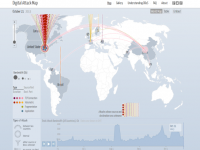Google wants to ensure that people who live in conflict-ridden regions and under governments that routinely restrict Internet access can still get online, and to further that goal it has built three new tools to provide protection.
The tools were announced Monday at the Google Ideas Summit in New York, with the hope that they could become key weapons in the struggle to ensure Internet access in places like Iran, North Korea, China, Cuba, and Syria, said Jared Cohen, the director of Google Ideas.
"This is a company of activists and white-hat hackers," Cohen told Time.
"When you work at Google and tell these engineers that their skill set is relevant to somebody in Iran who doesn't have access to information in their country or the rest of the world, it really inspires them to want to do something about it. There is a genuine altruism that exists at this company, and that's why I'm here and not anywhere else," he said.
Cohen is a 31-year-old geopolitical expert who has served as an adviser to former US Secretaries of State Condoleeza Rice and Hillary Clinton, and co-wrote "The Digital Age" earlier this year with Google Executive Chairman Eric Schmidt.
Two tools are focused on tracking and preventing distributed denial-of-service (DDoS) attacks. Project Shield is a new initiative that lends Google's own technology for preventing DDoS attacks to other Web sites, while the Digital Attack Map is a visualization tool that shows these attacks as they occur around the globe, built in collaboration with DDoS prevention specialist firm Arbor Networks.
"The goal of this collaboration was to show what a global threat DDoS is and how DDoS can be used to suppress speech and threaten open access to information," Arbor President Colin Doherty said in a press release.

The DDoS Digital Attack Map, from Google and Arbor Networks.
The third new weapon for the rebels' arsenal is Web browser extension uProxy, which allows you to share your Web connection with others to prevent tracking. Google seeded funds for uProxy, which was built by the University of Washington and Brave New Software.
By allowing people in nations with restricted Internet access to route their Web connections through countries like the United States, Google is not only helping them, but potentially boosting its bottom line as one of the world's Internet giants, with its fingers in more Internet and technology-based pies than almost any other.
Cohen told Time that Google had no business interest in countries like Iran, Syria, and Sudan. "We care about free expression, and this is an example of us putting our product where our mouth is."
However, he left unanswered the risks in sharing an Internet connection with an unknown person or company from a country under strife.

